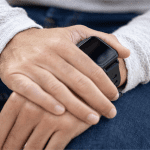
Is your smartwatch, which already measures your physical activity, capable of detecting contamination with the coronavirus before the onset of symptoms? Researchers wonder if connected accessories could not be used to warn their wearer in the very first days, this crucial period when a person can be contagious without suspecting it.
Last month, scientists at the Rockefeller Institute for Neuroscience at West Virginia University said they had created a digital platform capable of locating the Covid-19, using the Oura connected ring and an artificial intelligence system. Their application predicts the appearance of symptoms (fever, cough, and breathing difficulties) up to three days before and with 90% accuracy, they say.
The Scripps Research Institute, for its part, mobilized more than 30,000 people to participate in a study aimed at determining how the accessories could identify asymptomatic or “pre-symptomatic” carriers of the disease. The devices “have the potential to identify contagious people” despite the absence of symptoms, says Jennifer Radin, one of the epidemiologists who lead the research. This institute has already demonstrated its potential in predicting influenza, according to a study published in January in the journal The Lancet.
Accessories measure “subtle changes,” says Jennifer Radin, perhaps more precise and compelling than temperature controls. Because “40% of people who catch Covid-19 do not have a fever,” she recalls. For example, the devices monitor the resting heart rate, a good indicator of the start of the infection. “We see changes (in the pulse) 4 days before someone has a fever,” explains the researcher. Eric Topol, the director of the Scripps Institute, believes that the idea of using accessories is promising “because 100 million Americans wear a connected watch or bracelet”.
But the study will only bring conclusive results if many volunteers agree to participate. Californian start-up Evidation is trying to develop an early warning algorithm using connected accessories worn by 300 people who are very exposed to the risk of contracting the disease, with financial assistance from the government and the Bill & Melinda foundation Gates.
The research should “more effectively identify when and where people catch Covid-19, and potentially facilitate real-time interventions to limit the spread and assess the results,” said Luca Foschini, co-founder of Evidation.
Medicine is increasingly considering the use of connected accessories in diagnosis, as they can monitor body temperature, heart and respiratory rates, sleep, physical activity and other indicators.
Apple has launched studies to assess the ability of the Apple Watch to detect heart problems. Fitbit, its competitor in the connected watch segment, is involved in 500 different projects on cancer, diabetes, respiratory diseases, and other health concerns. “The watches and other accessories are worn on oneself take at least 250,000 measurements per day, which makes them very powerful tracking devices”, notes Michael Snyder, of the Stanford medical school.
Researchers from this university announced in April their participation in research on this type of connected object and various diseases, including Covid-19, in partnership with Scripps.
Michael Snyder hopes that, in the near future, accessories will connect humans with the warning signs of infection or other ailments. “When you are wondering if you have allergies or are getting sick, these algorithms can help you determine if you should stay home because your body is repelling a virus,” he predicts.
Digital marketing enthusiast and industry professional in Digital technologies, Technology News, Mobile phones, software, gadgets with vast experience in the tech industry, I have a keen interest in technology, News breaking.